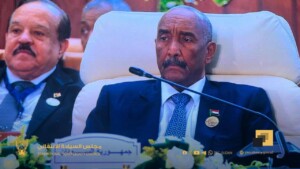General coordination: Darfur displaced demand justice
The displaced people of Darfur demand justice, security, investigations into crimes against humanity, civil liberties, and the disarmament of militias as their top priorities, their spokesmen says.
 An aerial view of Kalma camp near Nyala, South Darfur (file photo)
An aerial view of Kalma camp near Nyala, South Darfur (file photo)
The displaced people of Darfur demand justice, security, investigations into crimes against humanity, civil liberties, and the disarmament of militias as their top priorities, their spokesmen says.
In an interview with Radio Dabanga, Yagoub Abdallah, Chairman of the Darfur Displaced and Refugees General Coordination, stressed that transitional justice is necessary to achieve peace.
This means that all those indicted must be handed over to the International Criminal Court (ICC), especially ousted president Omar Al Bashir. Reform of the justice system is necessary as well, he added, “to try all other criminals”. Weapons must be collected. Mechanisms must be put in place to develop new laws to implement peace.
Abdallah stated that all new settlers must be removed from the lands they now occupy. These lands must be returned to their owners. Individual and collective compensations must be awarded when peace and security have been achieved.
When justice has been achieved, a commission must be established “to restore harm done and create tolerance that leads to reconciliation”, he demanded. This commission must work under international supervision, and be composed of experts from the state, the armed rebel movements, and the displaced and refugees themselves.
The assessment of the individual and collective compensations awarded must be based on international standards, Abdallah said. In the view of the displaced, collective compensation must include the reconstruction of all villages that have been destroyed or burned, provision of water, electricity, health care, education, law enforcement, and agricultural assistance.
Workshop
A Transitional Justice and Peaceful Coexistence Workshop was concluded in Kalma camp for the displaced near Nyala in South Darfur on Tuesday. A large number of camp administrators and camp residents took part.
Idris Haroun, who lives in Kalma camp, told Radio Dabanga that the workshop was organised by the camp’s Sudan Democracy First Group, and that it started on Monday.
He explained that the workshop discussed how criminals are to be handed over to the ICC, how the new settlers (who have occupied the lands of the displaced) are to be expelled, how weapons are to be collected, how individual and collective compensation is to be awarded, how villages are to be reconstructed, how the displaced can voluntarily return and how power sharing with the victims can be achieved.
Radio Dabanga’s editorial independence means that we can continue to provide factual updates about political developments to Sudanese and international actors, educate people about how to avoid outbreaks of infectious diseases, and provide a window to the world for those in all corners of Sudan. Support Radio Dabanga for as little as €2.50, the equivalent of a cup of coffee.












 and then
and then